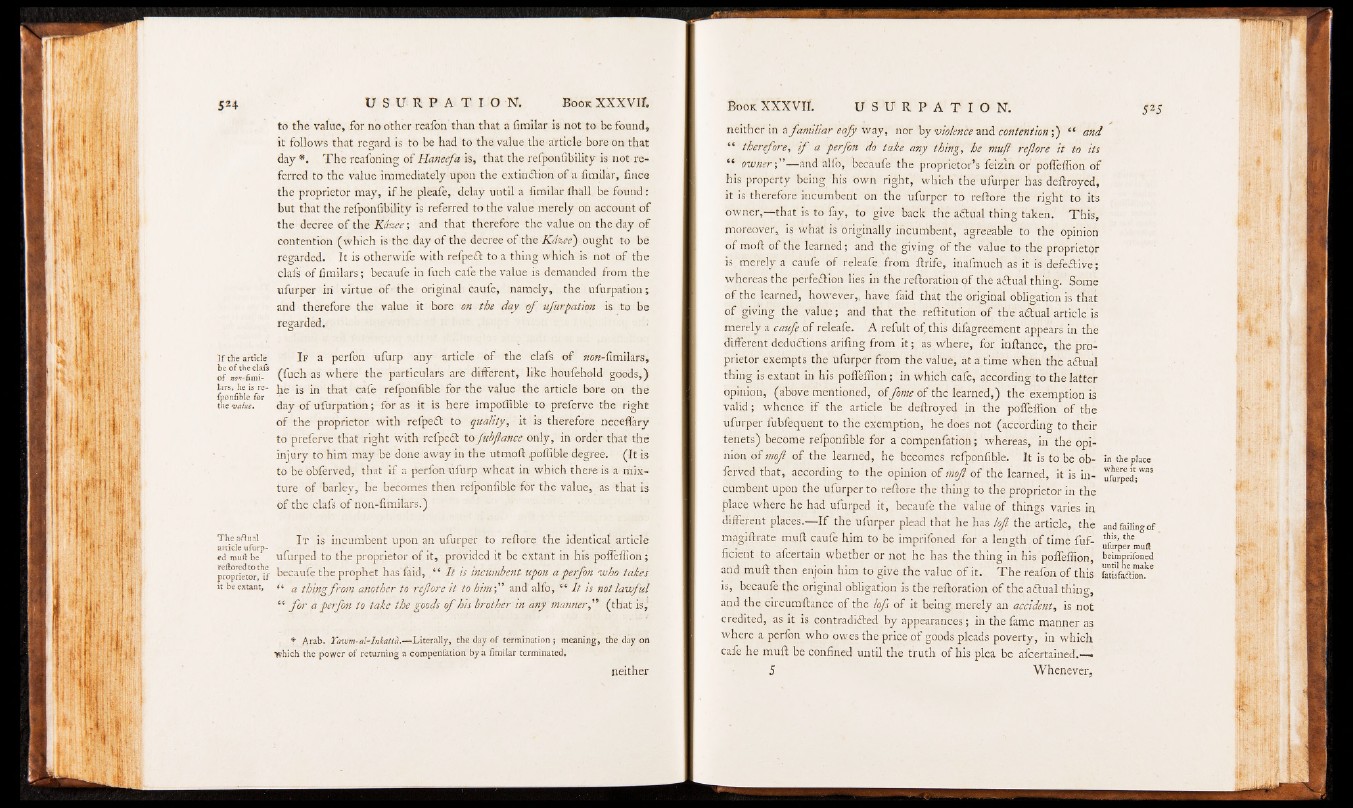
S24
to the value, for no other reafon than that a fimilar is not to be found,
it follows that regard is to be had to the value the article bore on that
day *. T h e reafoning of Haneefa is, that the refponfibility is not referred
to the value immediately upon the extinction of a fimilar, fince
the proprietor may, i f he pleafe, delay until a fimilar ihàll be found :
but that the refponfibility is referred to the value merely on account of
the decree of the Kasee ; and that therefore the value on the day o f
contention (which is the day of the decree of the Kâ%ee) ought to bè
regarded. It is otherwife with refpeâ to a thing which is not of the
clafs of fimilars; becaufe in fuch cafe the value is demanded from the
ufurper in virtue of the original caufe, namely, the ufurpation ;
and therefore the value it bore on the day o f ufurpation is to be
regarded.-
I f the article I f a perfon ufurp any article of the clafs o f »««-fimilars,
(fuch as where the particulars are different, like houfehold goodsj)
lars. he is re- jje j s j n that cafe refponfible for the value the article bore on the
fponfible for A .
the value» day of ufurpation; for as it is here impomble to prelerve the right
of the proprietor with refpeft to quality,: it is therefore neceflàry
to preferve that right with refpett to fuhflance only, in order that the
injury to him may be done away in the utmoft .poffible degree. (It is
to be obferved, that if a perfon ufurp wheat in which there is a mixture
of barley, he becomes then refponfible for the value, as that is
of the clafs of non-fimilars.)
T h e aftual j T js Incumbent upon 911 ufurper to reftore. the identical article
article ufurp- x 1 .. • :
ed muft be Tifurped to the proprietor of it, provided it be extant in his ponenion ;
proprietor'''if becaufe the prophet has f a i d , It is incumbent upon a perfon who takes
it be extant, “ a thing from another to r e f ore it to him and alfo, “ It is not lawful
“ fo r a perfon to take the goods o f his brother in any manner, ” (that is,1
* Arab. Ymvm-al-Inkattà.— Literally, the day o f termination; meaning, the day on
which the power o f returning a compenfation by a fimilar terminated.
neither
neither in a familiar eafy way, nor by violence and contention;) “ and
“ therefore, i f a perfon do ta’ke any thing, he muß reflore it to its
“ owner-,” — and alfo, becaufe the proprietor’ s feizin or pofi'eflion of
his property being his own right, which the ufurper has deftroyed,
it is therefore incumbent on the ufurper to reftore the right to its
owner,— that is to fay, to give back the actual thing taken. T h is ,
moreover,, is what is originally incumbent, agreeable to the opinion
of mod of the learned ; and the giving óf thé value to thq proprietor
is merely a caufe of releafe. from ftrife, inafmuch as it is defective;
whereas the perfection lies in the reparation pf the a£tual thing, Some
of the learned, however,, have faid that the original obligation is that
of giving the value; and that the reftitution o f the actual article is
merely a caufe of releafe. A refult of, this difagreement appears in the
different deductions arifing from i t ; as where, for inftanee, the proprietor
exempts the ufurper from the value, at a time when the actual
thing is extant in his poflèffion; in which cafe, according to the latter
opinion, (above mentioned, offome of the learned,) the exemption is
valid; whence i f the article be deftroyed in the poffeflion of the
ufurper fubfequent to the exemption, he does not (according to their
tenets) become refponfible for a compenfation; whereas, in the opinion.
of mofl of the learned, he becomes refponfible. It is to be ob- in the place
fej-ved that, according to the opinion of moft of the learned, it is in- "f1^recjt.was
cumbent upon the ufurper to reftore the thing to the proprietor in the
place where he had ufurped it, becaufe the value of things varies in
different places.— I f the ufurper plead that he has lofl the article, , the and failing of
magiftrate muft caufe him to be imprifoned for a length of time fuf- the -
c . r ' 0 ufurper muft
hcient to alcertain whether or not he has the thing in his pofïèfïion, beimprifoned
and muft then enjoin him to give the value of it. T h e reafon of this felhfafliom8
is, becaufe the original obligation is the reftoration of the a£tual thing,
and the circumftance of the lofs of it being, merely an accident, is not
credited, as it is contradifted by appearances; in the fame manner as
where a perfon who owes the price of goods pleads poverty, in which
cafe he muft be confined until the truth of his plea be afcertained.—.
5 Whenever.